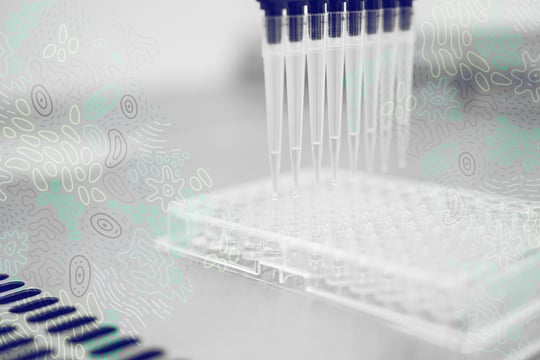Probiotic and starter culture products
Biosafe’s comprehensive service package for probiotics & starter cultures
Biosafe offers a suite of specialized services tailored for companies developing and operating with probiotics and starter cultures. Our expert team is dedicated to ensuring the highest standards of safety, efficacy, and quality in your products.
Here’s a look at the services we offer:
-
-
Hemolytic activity
Hemolysis is one of the pathogenic mechanisms of bacteria. There are three primary types of hemolysis:
- Alpha-hemolysis (α-hemolysis): This type is characterized by a partial or “green” hemolysis. The area around the bacterial colony on the blood agar plate appears greenish due to the oxidation of hemoglobin to methemoglobin.
- Beta-hemolysis (β-hemolysis): This type involves complete lysis of the red blood cells around the bacterial colony, resulting in a clear, transparent zone on the blood agar. Beta-hemolysis is caused by hemolysins produced by the bacteria.
- Gamma-hemolysis (γ-hemolysis): Also known as non-hemolysis, this type shows no hemolysis or change in the blood agar around the bacterial colony. Bacteria that exhibit gamma-hemolysis do not produce hemolysins.
Ensure the safety of your probiotic strains with our precise hemolytic activity testing, which detects potential harmful effects on red blood cells.
-
-
-
Biogenic amine analysis
Biogenic amines are organic compounds derived from amino acids. They are formed through the decarboxylation of amino acids or by amination and transamination of aldehydes and ketones. These compounds are found in various foods, especially those that are fermented or have undergone microbial activity.
Biogenic amines include e.g.:
- Histamine
- Tyramine
- Putrescine
- Cadaverine
- Phenylethylamine
Analysis of other biogenic amines (tryptamine, spermidine and spermine) is possible, too. We will design the test together with the customer.
Why They Might Be Hazardous
Biogenic amines can pose health risks when consumed in high amounts. Here are some reasons why they might be hazardous:
- Toxicity: High levels of biogenic amines can lead to food poisoning. Histamine, for example, can cause symptoms like headaches, rashes, and gastrointestinal distress, a condition known as "scombroid poisoning". typically from fish or seafood.
- Allergic Reactions: Some biogenic amines can trigger allergic-like reactions, including hives and respiratory issues.
- Blood Pressure Effects: Compounds like tyramine can affect blood pressure, potentially leading to hypertensive crises.
- Carcinogenic Potential: Certain biogenic amines can form nitrosamines, which are carcinogenic, especially when combined with nitrites in processed meats.
Food Safety
To ensure food safety, it's important to control the levels of biogenic amines in food products. This involves proper storage, handling, and processing to minimize microbial activity that leads to their formation.
Protect consumer health by identifying the potential of the microorganism to produce biogenic amines, and quantifying biogenic amines in your products, preventing adverse reactions and ensuring compliance with safety standards. Biosafe helps from preparation of samples to quantification of biogenic amines.
-
-
-
D-lactate / L-Lactate analysis
Lactate is a byproduct of anaerobic metabolism, where glucose is broken down for energy without using oxygen. There are two forms of lactate: D-lactate and L-lactate. Both have distinct roles and implications for health.
Production:
- L-lactate is the form of lactic acid normally produced and metabolized by the human body. It is generated during anaerobic glycolysis, primarily in muscle cells and red blood cells.
- D-lactate is produced in much smaller amounts in the human body and is primarily generated by certain bacteria in the gut during carbohydrate fermentation.
While typically not a concern for healthy individuals, those with certain gastrointestinal conditions should be cautious of foods that may increase D-lactate production. Optimize the metabolic profile of your probiotic strains with our D-lactate and L-lactate analysis, crucial for assessing the balance and functionality of lactic acid production. We can measure the production of D-lactate and L-lactate of your probiotic strain.
-
-
-
Bile salt hydrolysis test
The bile salt hydrolysis (BSH) test is used to evaluate the ability of probiotic strains to hydrolyze bile salts. This test is crucial in the development of probiotics for several reasons:
Key purposes of the BSH test
- Bile tolerance: Probiotics need to survive the harsh conditions of the gastrointestinal tract, including the presence of bile. BSH activity helps probiotics deconjugate bile salts, which can reduce their toxicity and enhance the survival of the probiotics in the gut.
- Cholesterol reduction: BSH activity is associated with the cholesterol-lowering potential of probiotics. By deconjugating bile salts, probiotics can prevent the reabsorption of bile acids, leading to increased excretion of cholesterol from the body.
- Gut health: The deconjugation of bile salts by BSH-active probiotics can influence the gut microbiota composition and improve gut health. This activity can help in maintaining a balanced gut environment by reducing the growth of harmful bacteria.
Practical applications
- Strain selection: The BSH test is used to select probiotic strains that are more likely to survive and function effectively in the human gut.
- Product development: Probiotics with BSH activity are often included in formulations aimed at improving digestive health and reducing cholesterol levels.
Evaluate the ability of your probiotic strains to survive and thrive in the gastrointestinal environment with our bile salt hydrolysis test, ensuring their effectiveness in promoting gut health.
-
-
-
Adhesion assays
Adhesion analysis is a critical test in the development of probiotics. It assesses the ability of probiotic strains to adhere to the intestinal mucosa, which is essential for their effectiveness. Here’s why this test is important:
Key purposes of adhesion analysis
- Colonization: Adhesion to the intestinal lining allows probiotics to colonize the gut, even if temporarily. This colonization is crucial for exerting beneficial effects, such as enhancing the gut barrier and modulating the immune system.
- Pathogen exclusion: Probiotics that adhere well can outcompete pathogenic bacteria for binding sites on the intestinal mucosa. This competitive exclusion helps prevent infections and supports a healthy gut microbiota.
- Enhanced interaction: By adhering to the gut lining, probiotics can interact more effectively with the host’s cells. This interaction can lead to the production of beneficial compounds like short-chain fatty acids and can stimulate immune responses.
Practical applications
- Strain selection: Adhesion analysis helps in selecting probiotic strains with strong adhesive properties, ensuring they can survive and function in the gastrointestinal tract.
- Product development: Probiotics with high adhesion capabilities are preferred for formulations aimed at improving gut health and preventing gastrointestinal infections.
Biosafe performs in vitro tests using intestinal cell lines to measure the binding ability of probiotics to epithelial cells .
Adhesion analysis is a vital step in ensuring that probiotic strains can effectively colonize the gut and provide health benefits to the host.
-
-
-
Acid tolerance test
The acid tolerance test is crucial in evaluating the ability of probiotic strains to survive the acidic environment of the stomach. This test helps ensure that probiotics can reach the intestines alive, where they can exert their beneficial effects.
Key purposes of the acid tolerance test
- Survival in the stomach: The stomach's acidic environment (pH 1.5 to 3.5) can be harsh on probiotics. The acid tolerance test assesses whether probiotic strains can withstand this acidity and remain viable.
- Strain selection: Probiotics that demonstrate high acid tolerance are more likely to survive gastric transit and colonize the gut. This test helps in selecting robust strains for probiotic formulations.
- Product development: Ensuring that probiotics can survive stomach acidity is essential for developing effective probiotic products. This test is a standard part of quality control in probiotic manufacturing.
Methods of acid tolerance testing
- In vitro simulated gastric juice: Probiotic strains are exposed to a simulated gastric juice environment with a low pH, often around 2.0 to 3.0, for a specified period (usually 1-2 hours). The survival rate of the strains is then measured.
- Presence of pepsin: Sometimes, pepsin (a digestive enzyme) is included in the test to mimic the stomach's conditions more accurately. The presence of pepsin can affect the survival rates of different strains.
Practical applications
- Optimizing conditions: Researchers optimize the conditions of the acid tolerance test to ensure accurate and consistent results. Factors like pH, exposure time, and the presence of pepsin are adjusted to reflect realistic gastric conditions.
- Screening for robust strains: The test helps identify probiotic strains that can survive the acidic environment of the stomach, ensuring they can reach the intestines and provide health benefits.
The acid tolerance test is a fundamental step in developing effective probiotic products, ensuring that the selected strains can survive the journey through the stomach and colonize the gut.
Determine the resilience of your probiotic strains in acidic conditions, simulating the stomach environment to ensure they reach the intestines alive and active.
-
-
-
Genetic stability
Guarantee the consistency and reliability of your probiotic strains over time with our genetic stability testing, safeguarding their beneficial properties through successive generations. Depending on the product, we can use Pulsed Field Gel Electrophoresis or Whole genome sequencing to establish the stability of your probiotic strain.
-
-
-
Bioinformatic analyses and more
Bioinformatic analysis of the whole genome sequence of a probiotic strain is a basis for strain safety. Sometimes gene expression data is beneficial to understand how a strain behaves under the growing conditions. Contact our bioinformatics experts for more information. Our antimicrobial susceptibility tests and cytotoxicity tests are mandatory for some probiotic strains. Biosafe is specialized in microbial safety, please ask for other tests and customized analysis from our experts.
-

Partner with Biosafe to leverage our carefully designed services and elevate the quality and safety of your probiotic and starter culture products. Contact us today to learn more about how we can support your innovation and growth in this dynamic field.
Contact us

Jouni Heikkinen
Key Account Manager, PhD
+35840 016 5829
jouni.heikkinen@biosafe.fi

Arja Tervahauta
R&D Manager, PhD
+35840 6196 222
arja.tervahauta@biosafe.fi
Book a free consultation appointment
Request a quote or ask for more information!
You can also make an appointment for a free consultation.












